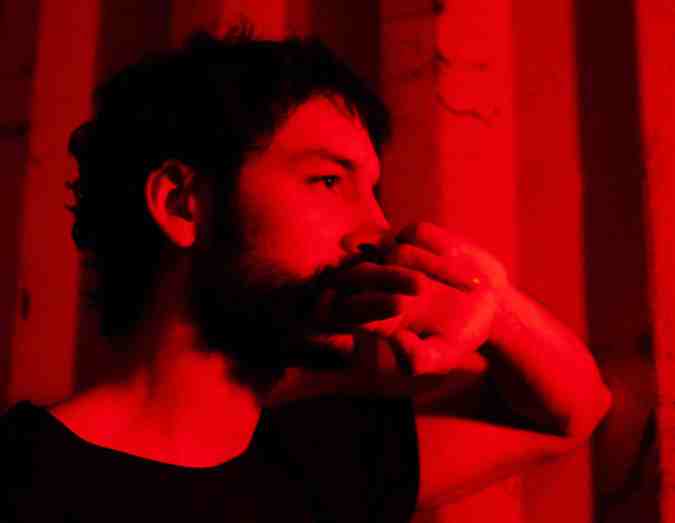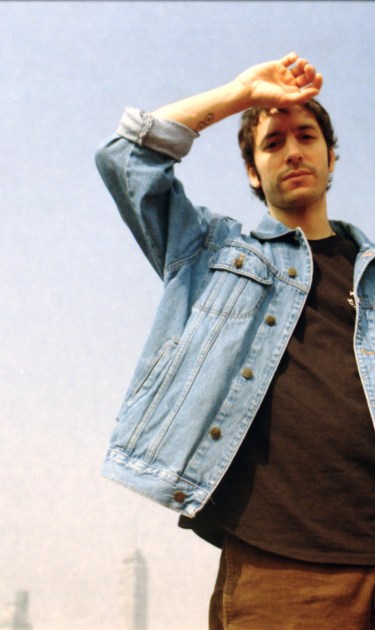Nicola Cruz is playing a DJ set on a rooftop in Mexico City where drink prices are as high as the Torre Latinoamericana, whose nearby digital clock face winks commiseratively through the night air. The crowd is rife with expressive, wide-brimmed hats, plus shawls in natural tones, and impeccable haircuts. These Cruz fans dance prudently to his melange of traditional percussion and flutes with tribal, techno, trance. The vibe is familiar, but hard to pinpoint until a friend leans over and murmurs, “It’s the Tuluminati.” Fellow dancers do seem to be the denizens of the town that has gained a rep for being the Williamsburg of the tropics.
But if one is surprised to find that Cruz’s crowd can be a bit cringe-y, his music is far from. The Ecuadorian producer has been roundly hailed for his experimental blends, in which he inserts traditional sounds of South America into electronic song structures. A typical Cruz album is the kind of positive-vibrating frequency suitable for illuminating a grey morning, even an impossible midnight.
His upcoming album Siku (slated for a January 25 release on Buenos Aires label ZZK) may sound a bit less adventurous on the club fusion front than its predecessor, 2015’s Prender El Alma. On Siku, electronic vibes are used sparingly, “just to color the whole thing,” as Cruz explained in a phone interview. Instead, his focus was mainly on the creation process, which took place with a global cast. “I call it the Nicola Cruz Jazz Band,” he laughs. Even the LP’s title is a nod to the alchemy of pairing, referencing an Andean panpipe whose form lends itself to a duet dynamic.
As a rule, his Siku collaborators are artists who Cruz finds “share the same vision and feeling towards music, which is openness,” he says. “As simple as it sounds, you do not always find this in other creatives.” Among the new songs you will find the album’s second teaser “Arka,” which Cruz recorded in “an artificial cave done by an architect” with Ecuadorian wind instrumentalist and neighbor Esteban Valdivia on side of the Ilaló volcano, which Cruz can see from his current home outside of Quito. The results combine fiery percussion with Valdivia’s flutes; very little post production frill is evident. “I like to leave [a song] raw, so that it is very expressive sound-wise, not only music-wise,” says Cruz. Other collaborators on the album include a diversity of artists exploring the edges of folk music; Brazilian artist Castello Branco, Portuguese percussionist Márcio Pinto, the Colombia-Sweden based duo Minük, and Chilean members of the group Altiplano Mauricio, Julio, and Pablo Vicencio.

This far-flung scope of his fellow artists is by design. As Cruz’s star rises and he becomes more and more known for his interpretations of indigenous South American music in faraway venues — recent gigs have included Glastonbury Festival, Berlin’s legendary Berghain nightclub, plus gigs in Japan and Dubai — he finds himself valuing flexibility. “They expect me to show up with a poncho and feathers and play all the songs that I have played thousands of times, and therefore do not want to play anymore, like ‘Colibria’ [from Prender El Alma],” Cruz says. On Siku, he expands his auditory profile past any minimizing stereotypes of what makes a South American artist.

Despite what his recent catalogue may suggest, and in contrast to some Ecuadorian artists who are likewise experimenting with traditional sound-inflected club blends, Cruz does not explicitly correlate his artistic identity with indigenous sound traditions. Ecuador is simply a “folkloric country,” he says. When Cruz was three, his family moved back to Quito from Limoges, France, where his Ecuadorian parents studied and Cruz was born. From that point on, traditional Ecuadorian music like that of otavaleño group Ñanda Mañachi was a simple fact of life.
Cruz says he can’t recall any particular moment in which he decided it was essential to integrate his country’s traditional sounds into electronica, no particular tradition or artist or label that spurred him to journey into South America’s past for his 20-teen auditory voyages. When queried as to how and why he made this hybrid his practice, he pauses. “I get asked this a lot,” he says. “Whenever it happens I’m like, ‘Yeah, how did I come to that?’ [Traditional sounds are] just around Quito all the time.”

What does he think is the importance of traditional music in the modern day music industry? Again, Cruz is not eager to give you an ideological motivation for his work. “It just felt like a nice blend,” he tells me. “Once again, never thought about it too much.” In an age of commercialized social justice language, perhaps some will find this plainness refreshing. For others, it may raise more questions about the Tuluminati’s attraction to Cruz’s dance-friendly oeuvre. Whatever the case, with the release of Siku, his recent booking at Sonar 2019 and other high profile engagements, Cruz seems destined to bring his particular concoctions further and further afield from the Ecuador in which they were born.




